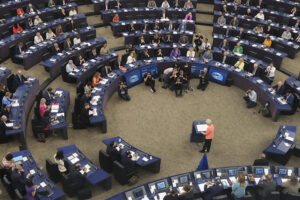Such an open-ended national effort would be a welcome breeze of fresh air to help clear out what our stale discourse presently allows.
The nation seems ready to lend support to a formal effort to rebuild traditions, norms and institutions that have been weakened by the Trump administration. It is time for individuals representing the nation’s cities, blue states, federal workers, unions and universities to start the necessary and arduous process of imagining and preparing priorities for quick action when the Congress and Presidency are able to restore civil values that have been honored over the decades. A smarter set of constitutional amendments would have already put us on this path. As it is, we must stand by idly to gain formal political leverage to act in defiance of the sabotage undertaken by this administration.

Obviously, a national convention of patriots to rebuild the nation would admittedly not have formal powers. But as The Guardian’s Thomas Geoghegan notes in his similar call for a convention of blue states, the first continental congress held in Philadelphia had “no apparent legitimacy or precedent,” but still had big consequences.1 The founders had to make a similar decision to act beyond what was possible within the political status quo.
My guess is that there would also be many Republicans who are anxious to reset the nation by considering new, productive, and suitably conservative ideas. Enlisting moderate Republican governors would be a good start. Many have clearly been inhibited by the hyperpartisanship of the Trump wing of the party.

We could assume that conservative and liberal sides would be willing to come together to make something better. Geoghegan notes that the result may be more theater than specifically deliberative, but such an organized national effort would be a welcome breeze of fresh air beyond what our fetid discourse from our entrenched politicians presently allows.
Initial concerns might include:
*whether the Presidency has the kinds of prerogatives and safeguards that the nation needs,
*whether Congress is too big or small to carry out legislative functions,
*whether money in campaigns should be limited, and
*if more federal functions supported by block grants should be taken over by the states.
Published recommendations receiving the most support could be distributed by receptive media. Topics like these would benefit by having fresh and younger voices more clearly heard.
Organizations that could convene an ongoing conference of national reconstruction might include good government organizations like Common Cause, The National Conference of State Legislators, The United States Chamber of Commerce, The Brennan Center for Justice, and the Pew Research Center. All have traditionally presented credible work that cuts across rigid partisan lines. All would also have to propose some of the attendees, and sign on to the idea that the nation needs an extraordinary Convention of National Reconstruction.
 There is also a tradition of calling on the services of respected former cabinet, state or Senate officials who could use their experience and wisdom to guide such an effort. We had such “wise old men (and women)” who helped the nation through the tough final years of the Nixon administration. We could find and enlist their contemporary counterparts again. Think of individuals like former New Jersey Governor Christine Todd Whitman or former CIA Director Leon Panetta. There are many former state and federal office holders who would answer the call to help. And there would be more agreement on ways forward than we might think. The current broken norms, like the politicization of the Department of Justice, go unchecked largely because of the current suppression of open dissent by a vindictive President.
There is also a tradition of calling on the services of respected former cabinet, state or Senate officials who could use their experience and wisdom to guide such an effort. We had such “wise old men (and women)” who helped the nation through the tough final years of the Nixon administration. We could find and enlist their contemporary counterparts again. Think of individuals like former New Jersey Governor Christine Todd Whitman or former CIA Director Leon Panetta. There are many former state and federal office holders who would answer the call to help. And there would be more agreement on ways forward than we might think. The current broken norms, like the politicization of the Department of Justice, go unchecked largely because of the current suppression of open dissent by a vindictive President.
Members could forward high-consensus recommendations to the political parties, the media, and interested trade and professional groups. Many would welcome a “third way” to reinvigorate our national politics.
__________
1https://www.theguardian.com/commentisfree/2025/oct/05/blue-states-democrats-trump

